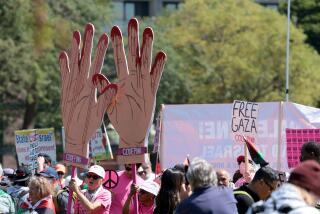‘Ethnic Cleansing’ Checks U.S. Antiwar Sentiment
- Share via
WASHINGTON — The minuscule antiwar movement in the United States is beginning to raise its voice over the U.S.-led bombing in Yugoslavia, but it has a long way to go to reach the level of turmoil that the nation saw during the Vietnam War.
Spurred by increasing incidents of NATO bombs killing and wounding Yugoslav civilians, a growing number of students and antiwar activists has begun holding teach-ins and other demonstrations at campuses around the United States.
So far, such protests have been few and small. A few hundred people attended a May 23 peace rally on Los Angeles’ Westside. The New School in New York drew 1,000 students to an April teach-in. There have been sporadic demonstrations in more than 30 states.
One reason the protests have been so low-key is that, unlike the Vietnam War, which was fought in the name of containing communism, NATO’s campaign in Yugoslavia is largely being waged for a humanitarian reason: to stop the “ethnic cleansing” of Kosovo Albanians.
Perhaps even more crucial, unlike at the height of the Vietnam era, the United States now has an all-volunteer army. U.S. college students are not currently in danger of being drafted to fight--and possibly die--in an unpopular conflict.
But the continued bombing of Yugoslav civilians--which NATO insists is inadvertent--has begun to raise concern among some activists. And the prospect that the United States may soon have to send combat troops to Yugoslavia has soured even some onetime hawks.
In the most visible such event so far, a coalition of 18 peace groups will stage a march from the Vietnam Memorial to the Pentagon on Saturday.
Sponsors say they hope to attract tens of thousands of participants.
Moreover, the peaceniks and placard-carrying college students are not alone. No less than former President Carter weighed in last week with a New York Times opinion piece in which he criticized U.S. military tactics in the Balkans as “senseless and excessively brutal.”
Nevertheless, there is considerable disagreement among analysts--and some participants in the peace movement--about how much stronger the protests are likely to become, even if the bombing continues or the conflict in Yugoslavia escalates.
Brian Becker, co-director of the liberal, antiwar International Action Center, and a principal organizer of Saturday’s march, predicts that unless the administration finds a way out of the bombing campaign soon, the protests will intensify quickly.
“The more the U.S. bombs, the bigger the demonstrations will get,” Becker said. “If there’s no early resolution--and if U.S. ground troops are sent to fight--the antiwar movement will become really fierce.”
But Todd Gitlin, a New York University professor who led antiwar sit-ins in the 1960s and keeps tabs on the peace movement today, doubts that the backlash will grow all that significantly, even if the administration opts to deploy ground troops in Yugoslavia.
“Most people are unimpressed by the arguments of the antiwar protesters because they see that we have a very different situation now than we had during the Vietnam War,” Gitlin said.
Analysts say popular perceptions of the war in Yugoslavia are playing an important role.
Television pictures of Kosovo refugees describing alleged Yugoslav atrocities and “ethnic cleansing” have evoked images of the Nazi Holocaust and pushed even longtime activists into demanding that the West do something to stop the persecution--even if that means using force.
Gitlin contends that in the age of globally televised human rights crises, many activists have come to support “humanitarian” intervention by U.S. military forces--and support the objective of the Kosovo operation--even if they are unhappy about the bombing.
The old response of antiwar protesters that war of any kind is bad is “not an automatic no,” Gitlin said. “There are a number of younger people now who are more hawkish than their parents’ generation.”
But analysts say a decline in President Clinton’s performance ratings as the NATO air campaign has hit civilian targets suggests that the administration’s ability to tap popular support for the intervention may be limited.
“Is this movement growing? Absolutely, and it’s growing with every civilian casualty we see in Yugoslavia,” said Gordon Clark, executive director of Peace Action, a long-standing pacifist group. But how rapidly is it likely to spread? “I wish I knew,” Clark conceded.
More to Read
Sign up for Essential California
The most important California stories and recommendations in your inbox every morning.
You may occasionally receive promotional content from the Los Angeles Times.













